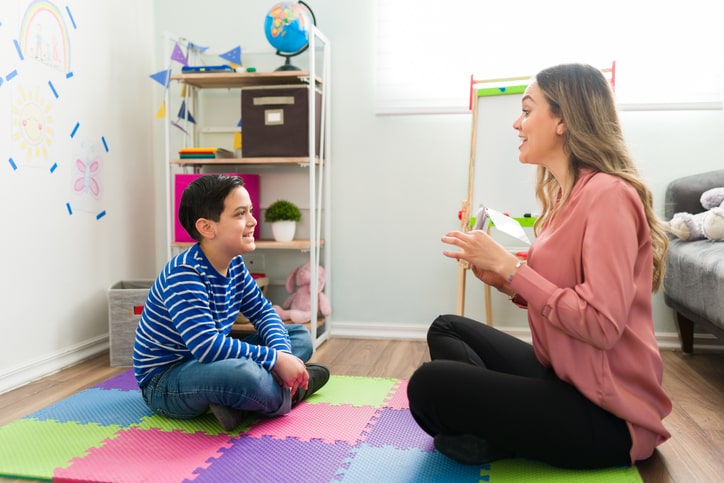Is Hyperlexia a Form of Autism?

Are you a parent with a child who is an exceptionally gifted reader, fascinated with letters and numbers, and reads texts and stories beyond their age level? If so, your child may have hyperlexia.
Children with hyperlexia show advanced literacy skills like spelling and reading words but often struggle with other aspects of learning, such as reading comprehension and language skills. Children with hyperlexia may have difficulty with visual processing, social interaction, communication, or focusing their attention which may lead you to believe that they have ADD/ADHD or autism.
However, It's possible they’re exhibiting signs of hyperlexia; a condition often referred to as "autistic-like reading. While hyperlexia isn’t considered a form of autism, there are some similarities between the two conditions.
In this article, we’ll take a look at the signs of hyperlexia, its relationship with autism spectrum disorder (ASD), and what you can do as a parent or educator to help a child with hyperlexia.
Is Hyperlexia a Learning Disability?

Hyperlexia is sometimes confused with a learning disability, but it is not considered a disability. That’s because hyperlexia occurs most frequently in children with autism. It is estimated that roughly 6-20% of children with autism also have hyperlexia.
There are three different types of hyperlexia, and your child will require a comprehensive evaluation by early childhood specialists, with the final diagnosis approved by their pediatrician. However, there are a handful of signs that most children with hyperlexia demonstrate.
Signs of Hyperlexia
- Advanced ability to sound out words
- Advanced spelling skills
- Increased interest in letters or words
- Behavioral difficulties
- Developmental delays: low communication, lack of social skills, or spoken language delays
- Below-average reading comprehension levels
- A strong interest in or affection for books
Autistic children and those with ADHD and other neurotypical conditions tend to have learning disabilities or other developmental disorders like dyslexia, dyscalculia, or dysphagia. Therefore, it is challenging, at times, to determine what might be causing a child’s behavioral problems or struggles in school.
Types of Hyperlexia
There are three recognized types of Hyperlexia: Hyperlexia I, Hyperlexia II, and Hyperlexia III.
Hyperlexia I
Hyperlexia I is characterized by a child who reads above their grade level without displaying autistic-like behaviors or signs. Hyperlexia tends to disappear independently and is typically considered a temporary condition.
Hyperlexia II
Coincides with autism. These children tend to obsess over letters and numbers and sometimes have a savant-like ability to recall numbers and dates. These children exhibit typical signs of autism, including avoiding eye contact, sensitivity to stimuli, and speech delay.
Hyperlexia III
Children with hyperlexia III initially present with the same symptoms of hyperlexia II, but over time the symptoms decrease and may disappear. These children become more social and affectionate but typically don’t excel at verbal language.
Darold Treffert, a psychiatrist, and researcher specializing in savant and autism spectrum disorders, discovered hyperlexia III. He was concerned because he noticed some children who exhibited early signs of hyperlexia and autism would eventually outgrow their symptoms but still maintain the diagnosis.
Is Hyperlexia Related to Autism?
Hyperlexia is commonly associated with autism but is not an autistic disorder. The Autistic spectrum is broad and covers a wide range of abilities related to social skills and learning. According to the Diagnostic and Statistical Manual of Mental Disorders (DSM-5), autism is characterized as:
- Difficulty with communication and interaction with other people
- Restricted interests and repetitive behaviors
- Symptoms that affect their ability to function in school, work, and other areas of life
Signs of Autism
- Little or inconsistent eye contact
- Speak late or non-verbal
- Facial expressions, movements, and gestures that do not match what is being said
- Slow to respond or a failure to respond to one’s name or other verbal bids for attention.
- Unable to predict or understand other people’s actions
- Appearing not to look at or listen to people who are talking
- Repeating certain behaviors or having unusual behaviors, such as repeating words or phrases (echolalia)
- Showing overly focused interests, such as with moving objects or parts of objects
- Easily upset by slight changes in a routine and struggling with transitions
- More or less sensitive than other people to sensory input, such as light, sound, clothing, or temperature.
- Lack of sharing interest, emotion, or enjoyment of objects or activities with others.
- Difficulties with the back and forth of conversation
- Often talking at length about a favorite subject without noticing that others are not interested or giving others a chance to respond.
- An atypical tone of voice that may sound sing-song or flat and robot-like
- Trouble understanding another person’s point of view
- Difficulty adjusting behaviors to match the social situation.
- Difficulty sharing in imaginative play or in making friends.
A child with autism has a higher chance of having hyperlexia, but they do not go hand in hand.
How to Help Your Child with Hyperlexia

If your child is diagnosed with hyperlexia, their pediatrician and team of special education therapists and specialists will develop a treatment plan that meets your child’s needs.
Parents should work with the special education department to develop an Individualized Education Plan (IEP) if their child is enrolled in school. These plans allow schools to provide accommodations and additional help in ways that best suit your child’s needs.
Parents may also wish to work with private therapists outside of school to build social skills, language skills, auditory processing, and reading comprehension.
Hyperlexia Therapy for Kids
Children with hyperlexia often benefit from speech and language therapy which can improve reading comprehension and written and spoken language skills. Increasing language skills often results in better social skills and academic performance.
Children with hyperlexia I do not require treatment as their differences in abilities tend to even themselves out on their own and eventually go away. Children who initially present with hyperlexia II may end up having hyperlexia III. However, their initial treatment should include therapies and strategies to develop their social skills, reading comprehension, and language development.
As with all learning disorders or psychological conditions, treatment should be adjusted as your child’s needs and skill change.
Realizing their child is differently-abled is sometimes concerning for parents. But if your child has been diagnosed with autism and subsequently hyperlexia, there is no reason to worry!
The field of neuroscience advances constantly, and many therapies are available to aid hyperlexic children. The best thing you can do as a parent is learn as much about autism and hyperlexia as possible and work as a team with your child’s pediatrician, school, and therapists to set your child on the right track!

